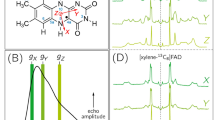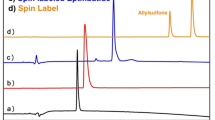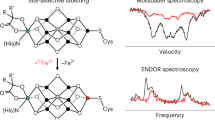Abstract
IT is known that a free radical appears when old yellow enzyme is reduced with triphosphopyridine nucleotide1. Flavin mono nucleotide (FMN) has been shown to give a free radical when reduced by dithionate or by a solution of zinc in hydrochloric acid2,3, and it is believed that this radical, which is of the semiquinone type, is related to the radical produced in the enzymatic reduction.
This is a preview of subscription content, access via your institution
Access options
Subscribe to this journal
Receive 51 print issues and online access
$199.00 per year
only $3.90 per issue
Buy this article
- Purchase on Springer Link
- Instant access to full article PDF
Prices may be subject to local taxes which are calculated during checkout
Similar content being viewed by others
References
Ehrenberg, A., and Ludwig, G., Science, 127, 1177 (1958).
Commoner, B., and Lippencoff, B. B., Proc. U.S. Nat. Acad. Sci., 44, 1110 (1958).
Ehrenberg, A., Acta Chem. Scand., 14, 766 (1960).
Lagercrantz, C., and Yhland, M., Acta Chem. Scand., 17, 904 (1963).
Author information
Authors and Affiliations
Rights and permissions
About this article
Cite this article
ORR, J. An Electron Spin Resonance Examination of Molecules related to the Isoalloxazine Ring System. Nature 201, 816–817 (1964). https://doi.org/10.1038/201816a0
Issue Date:
DOI: https://doi.org/10.1038/201816a0
This article is cited by
Comments
By submitting a comment you agree to abide by our Terms and Community Guidelines. If you find something abusive or that does not comply with our terms or guidelines please flag it as inappropriate.



